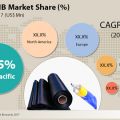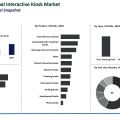Global fiberglass market expected to cross valuation of us$ 11.92 billion by 2027
Global Fiberglass Market: Highlights
- Fiberglass is the fiber made in different forms using molten glass as the raw material. Several glasses are introduced into the furnace to obtain fiberglass based on the end-application. These glasses include E-glass S-glass, ECR glass, C-glass and others.
- The fiberglass market is projected to grow at a CAGR of more than 4.5% from 2019 to 2027. Growth in lightweight vehicles coupled with upcoming wind energy projects in Asia Pacific market is likely to boost fiberglass market by 2027.
- The different forms of fiberglass are strands, rovings, yarn, mats, and fabric. Filament comes out of the bushing as the first product. These filaments are combined together to form either strands or yarn. These strands are pulled by the winders and wound into rovings which is used to make mats. The mats are also produced from strands.
Request a Sample-
https://www.transparencymarketresearch.com/sample/sample.php?flag=S&rep_id=1945
Global Fiberglass Market: Key Trends and Segments
- Fiberglass is a material with high strength, fatigue resistance, and stiffness. Therefore, it is utilized to manufacture blades for offshore and onshore wind turbines. The consumption of fiberglass in wind blade manufacturing has increased significantly due to technological advancements. Rising demand for wind energy is anticipated to drive the fiberglass market. Companies are signing long-term agreements in order to tap the market.
- Increasing demand for fiberglass from the automotive industry offers a lucrative opportunity to manufacturers of fiberglass that is employed in various vehicle components such as interiors, exteriors, chassis, and structural components. This trend is likely to continue during the forecast period.
- Availability of carbon fiber, due to its rigidity and lightweight properties, is a prominent challenge faced by the global fiberglass industry. Further, presence of numerous players from China supplying fiberglass at lower prices is creating a tough competition in the global fiberglass industry
- Different technologies used to process fiberglass include pultrusion, layup, compression molding, resin transfer molding, filament winding, injection molding and others. Layup and resin infusion technology dominated the global fiberglass market in 2018 in terms of technology with a share of more than 40%. The layup process is an extensively used technique for manufacturing composites. It involves impregnation of dry reinforcement with a low viscosity thermosetting resin with hand lamination, which can also be achieved by means of several other automated techniques. Resin transfer molding and vacuum assisted resin transfer molding are being readily adopted as low-cost methods for manufacturing fiberglass products.
- Automotive and construction sectors are the major applications that accounted for more than 40% in 2016 owing to the increasing demand for low-weight vehicles capable of reducing pollution.
Buy now-
https://www.transparencymarketresearch.com/checkout.php?rep_id=1945<ype=S
Global Fiberglass Market: Regional Highlights
- Middle East offers an interesting platform for the consumption of fiberglass due to the region’s increasing focus on construction industry in order to deviate from the decreasing revenue generation from oil production. This region also houses fiberglass production factories of leading players such as Jushi Fiberglass, Busubait Group, Gulf Fiberglass Factory, etc.
- Expansion of the automotive industry is driving the fiberglass market in Europe. Companies such as U.K.-based Cristex Composite Materials and Poland-based Fiberglass Fabrics are only into supplying fabrics to end-use industries. These companies do not have in-house fiberglass production. They rely on buying rovings from fiberglass manufacturers in order to produce fabric.
- North America accounted for more than 30% share in global fiberglass market in 2018. S glass and E glass are the major focus segments in terms of glass type in North America. Owens Corning and Johns Manville are key manufacturers of fiberglass in North America.
Key Developments in Global Fiberglass Market
- In February 2020, Moi Composite presented MAMBO (Motor Additive Manufacturing Boat), a fiberglass 3D printed boat collaborating with industrial partners: Autodesk (provided the tools for the realization of the three-dimensional drawing of the hull), Catmarine (transformed the various sections produced digitally into a finished boat), Micad (engineered comples structures) , Owens Corning (supplied the glass reinforcements fibers) , Osculati (provided accessories capable of adapting to the curves and design of the entire hull) and UCINA in order to overcome customized design and performance limits of conventional manufacturing and 3D printing for strong, lightweight and durable composite products.
- In June 2018, Owens Corning entered into a Strategic Cooperation and Supply Agreement with Chongqing Polycomp International Corp. (CPIC) for joint investment in technology, and construction and operation by CPIC of a new facility dedicated to the manufacture of high-modulus glass fiber products in China.
- In April 2018, Owens Corning entered into technology licensing and manufacturing supply agreements with Taiwan Glass Ind. Corp., based in Taiwan.
- In December 2017, Taishan Fiberglass announced its plan to invest US$ 76.28 Mn in its project which is anticipated to produce 5 kilo tons of ultra-fine electronic yarn glass fiber. This is expected to increase the company’s fiberglass capacity to 705 kilo tons, helping it to compete in the tough market in China, which is generating revenue by exporting products to the western countries.
Request for covid19 impact analysis –
https://www.transparencymarketresearch.com/sample/sample.php?flag=covid19&rep_id=1945
Global Fiberglass Market: Competition Landscape
- Major companies manufacturing fiberglass include Owens Corning, Jushi Group Co., Ltd., Taishan Fiberglass Inc., Johns Manville, Chongqing Polycomp International Corp., Xingtai Jinniu Fiberglass Co., Ltd., Shandong Fiberglass Group Co., Ltd., Glasstex Fiberglass Materials Corp., etc. among others.
- A majority of global manufacturers of fiberglass have forward integrated operations. Numerous fiberglass manufacturers are opting for strategic alliances with OEMs for market penetration.
The sustainability aspects have dramatically changes the raw material sourcing strategies for many businesses in the Fiberglass market. Players have become more responsible toward reducing or managing the waste, are adopting material informatics equipped with artificial intelligence (AI), and adopting energy-efficient production processes in order to maximize returns on invested capital.
More Trending Report-








